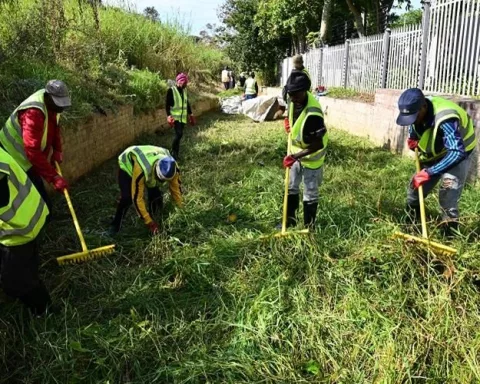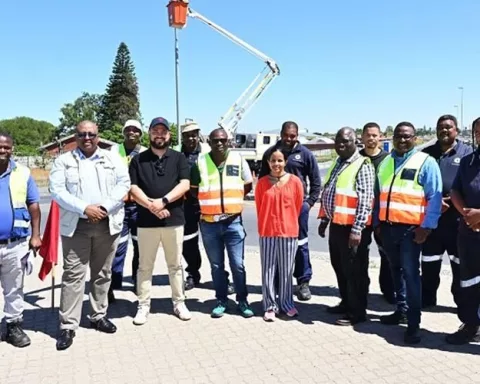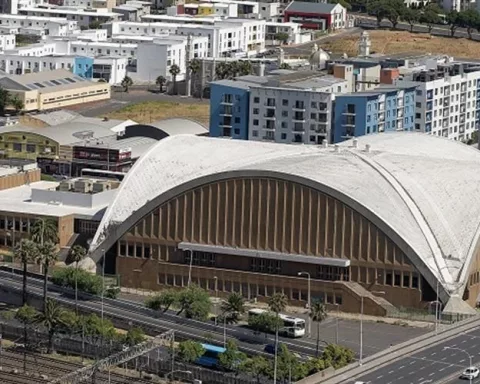The operation highlighted the need for better public awareness and responsible waste disposal practices. Everyone has a collective responsibility to preserve the environment, and every effort counts towards a cleaner, greener, and more beautiful Cape Town.
Coastal Management Branch, along with Shark Spotters and Coastal Conservation, cleaned up Bantry Bay’s caves resulting in an impressive total of 2,356 municipal bags of debris. The operation was initiated on August 19th and lasted four days. The cleanup highlighted the need for improved public awareness and responsible waste disposal practices. Ultimately, it’s on us, and every effort contributed takes us one step closer to a cleaner, greener, and more beautiful Cape Town.
Coastal Management Branch Embarks on Clean-Up Mission
Last week witnessed an astounding effort by the City’s Coastal Management Branch to restore the pristine beauty of the caves nestled within Bantry Bay, an enchanting section of the rugged shoreline along Victoria Road. Over a span of four days, a team of fifteen proficient workers labored exhaustively from the northern tip of Clifton to the southern edge of Bantry Bay. Their commendable efforts resulted in an impressive total of 2,356 municipal bags brimming with debris, all scavenged from the hidden recesses of this natural treasure.
This comprehensive clean-up operation was initiated on the morning of August 19th at 9:30 and carried on till 2:30 pm every day. The Coastal Management Branch, along with the assistance of Shark Spotters and the Coastal Conservation crew, oversaw this mammoth task, providing manpower and orchestrating logistics. Furthermore, the Urban Waste Management Directorate played a crucial part in the successful execution of this project, responsibly gathering the bags from several collection points. Meanwhile, local law enforcement ensured the safety and security of everyone involved in the operation.
In the words of Eddie Andrews, the Deputy Mayor and Mayoral Committee Member for Spatial Planning and Environment, the operation was no small feat. “The operation was not without its challenges, considering the rocky and steep terrain, unpredictable weather, and fluctuating tides,” he divulged. “Transporting the bags to the collection points from the litter-filled lower regions presented another hurdle.”
Factors Fostering Litter Accumulation
The litter’s location, as Andrews elucidated, was largely a consequence of both natural and human influences. Ocean currents and wave activity, bolstered by Cape Town’s infamous north-westerly winds, transported much of the refuse to this specific area. However, the role of human negligence cannot be overlooked. Unintentional littering by beach visitors and cave residents highlighted the critical need for improved public awareness and responsible waste disposal practices.
But amidst these challenges, there was a spark of motivation and call to action. Andrews urged both tourists and locals to take an active role in preserving Cape Town’s pristine environment. “I implore residents and visitors alike to use the bins provided, or better yet, take your litter home with you,” he appealed. He also expressed gratitude towards those who spontaneously pick up litter while enjoying a walk along the beach, further emphasizing that environmental preservation is a group responsibility.
Consequences, Call to Action, and Collective Responsibility
The Bantry Bay cleanup operation serves as a powerful reminder of the consequences our irresponsible actions can have on our environment. It highlights the crucial part we each play in safeguarding our natural spaces and the importance of collective action in upholding the beauty and cleanliness of our surroundings. The sight of thousands of rubbish-filled municipal bags is a sobering call to mindfulness, urging us to be more conscious of our waste disposal habits and respect the awe-inspiring landscape that graces Cape Town’s shoreline.
Ultimately, it’s on us. By implementing minor modifications in our daily routines, we can bring about significant improvements. The task might appear daunting, but as the Bantry Bay cleanup operation proves, it’s certainly achievable. Every piece of litter removed, every bag filled, and every effort contributed takes us one step closer to a cleaner, greener, and more beautiful Cape Town.
1. What was the goal of the Bantry Bay’s caves cleanup operation?
The goal of the Bantry Bay’s caves cleanup operation was to restore the pristine beauty of the caves nestled within Bantry Bay, an enchanting section of the rugged shoreline along Victoria Road, and highlight the need for improved public awareness and responsible waste disposal practices.
2. How many municipal bags of debris were collected during the cleanup operation?
A total of 2,356 municipal bags of debris were collected during the Bantry Bay’s caves cleanup operation.
3. Who initiated and oversaw the Bantry Bay’s caves cleanup operation?
The Coastal Management Branch, along with the assistance of Shark Spotters and the Coastal Conservation crew, initiated and oversaw the Bantry Bay’s caves cleanup operation.
4. What factors foster litter accumulation in Bantry Bay’s caves?
The litter accumulation in Bantry Bay’s caves is largely a consequence of both natural influences such as ocean currents and wave activity, bolstered by Cape Town’s infamous north-westerly winds, and human influences such as unintentional littering by beach visitors and cave residents.
5. What is the importance of collective responsibility in environmental preservation?
Collective responsibility is essential in environmental preservation as every effort contributed takes us one step closer to a cleaner, greener, and more beautiful Cape Town. The Bantry Bay cleanup operation serves as a powerful reminder of the consequences our irresponsible actions can have on our environment, highlighting the crucial part we each play in safeguarding our natural spaces.
6. How can individuals contribute to environmental preservation in Cape Town?
Individuals can contribute to environmental preservation in Cape Town by implementing minor modifications in their daily routines such as using the bins provided or taking litter home with them. They can also pick up litter while enjoying a walk along the beach and be more conscious of their waste disposal habits to respect the awe-inspiring landscape that graces Cape Town’s shoreline.












